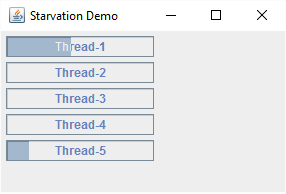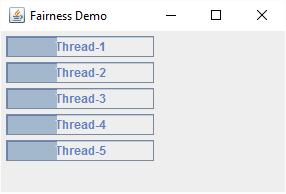
In multithreaded application starvation is a situation when a thread is constantly ignored to gain possession of the intrinsic lock in favor of other threads.
From Oracle reference docs:
Starvation describes a situation where a thread is unable to gain regular access to shared resources and is unable to make progress. This happens when shared resources are made unavailable for long periods by "greedy" threads. For example, suppose an object provides a synchronized method that often takes a long time to return. If one thread invokes this method frequently, other threads that also need frequent synchronized access to the same object will often be blocked.
Let's understand that with an example. We are going to create 5 threads and display progress of each thread on Swing JProgressBar:
public class StarvationDemo {
private static Object sharedObj = new Object();
public static void main (String[] args) {
JFrame frame = createFrame();
frame.setLayout(new FlowLayout(FlowLayout.LEFT));
for (int i = 0; i < 5; i++) {
ProgressThread progressThread = new ProgressThread();
frame.add(progressThread.getProgressComponent());
progressThread.start();
}
frame.setLocationRelativeTo(null);
frame.setVisible(true);
}
private static JFrame createFrame () {
JFrame frame = new JFrame("Starvation Demo");
frame.setDefaultCloseOperation(JFrame.EXIT_ON_CLOSE);
frame.setSize(new Dimension(300, 200));
return frame;
}
private static class ProgressThread extends Thread {
JProgressBar progressBar;
ProgressThread () {
progressBar = new JProgressBar();
progressBar.setString(this.getName());
progressBar.setStringPainted(true);
}
JComponent getProgressComponent () {
return progressBar;
}
@Override
public void run () {
int c = 0;
while (true) {
synchronized (sharedObj) {
if (c == 100) {
c = 0;
}
progressBar.setValue(++c);
try {
//sleep the thread to simulate long running task
Thread.sleep(100);
} catch (InterruptedException e) {
e.printStackTrace();
}
}
}
}
}
}
Output:

As seen above, it's evident that all threads are not given the equal chance to have equal CPU time. Some threads are starving for long time to acquire the shared lock.
Fairness
Fairness is the situation when all threads are given equal opportunity for intrinsic lock acquisition.
As we saw in above example that the long running thread has more chances to aquire the lock again consecutively.
In general we cannot predict how underlying thread scheduler (built in O.S.) chooses the next thread for the lock acquisition.
From developer perspective, the code should not hold the lock for a long time to make a thread greedy.
We can fix the above code by using wait() method which releases the lock but goes to waiting state i.e. the scheduler cannot choose it for the lock acquisition again. That way other threads are given the equal opportunity to run.
public class FairnessDemo {
private static Object sharedObj = new Object();
public static void main (String[] args) {
JFrame frame = createFrame();
frame.setLayout(new FlowLayout(FlowLayout.LEFT));
for (int i = 0; i < 5; i++) {
ProgressThread progressThread = new ProgressThread();
frame.add(progressThread.getProgressComponent());
progressThread.start();
}
frame.setLocationRelativeTo(null);
frame.setVisible(true);
}
private static JFrame createFrame () {
JFrame frame = new JFrame("Fairness Demo");
frame.setDefaultCloseOperation(JFrame.EXIT_ON_CLOSE);
frame.setSize(new Dimension(300, 200));
return frame;
}
private static class ProgressThread extends Thread {
JProgressBar progressBar;
ProgressThread () {
progressBar = new JProgressBar();
progressBar.setString(this.getName());
progressBar.setStringPainted(true);
}
JComponent getProgressComponent () {
return progressBar;
}
@Override
public void run () {
int c = 0;
while (true) {
synchronized (sharedObj) {
if (c == 100) {
c = 0;
}
progressBar.setValue(++c);
try {
//simulate long running task with wait..
// releasing the lock for long running task gives
//fair chances to run other threads
sharedObj.wait(100);
} catch (InterruptedException e) {
e.printStackTrace();
}
}
}
}
}
}
Output:

Example ProjectDependencies and Technologies Used:
|